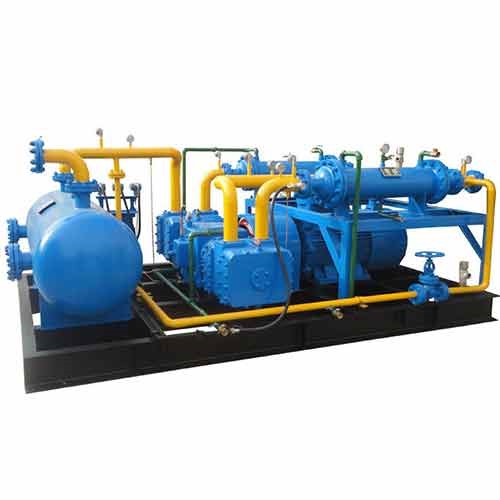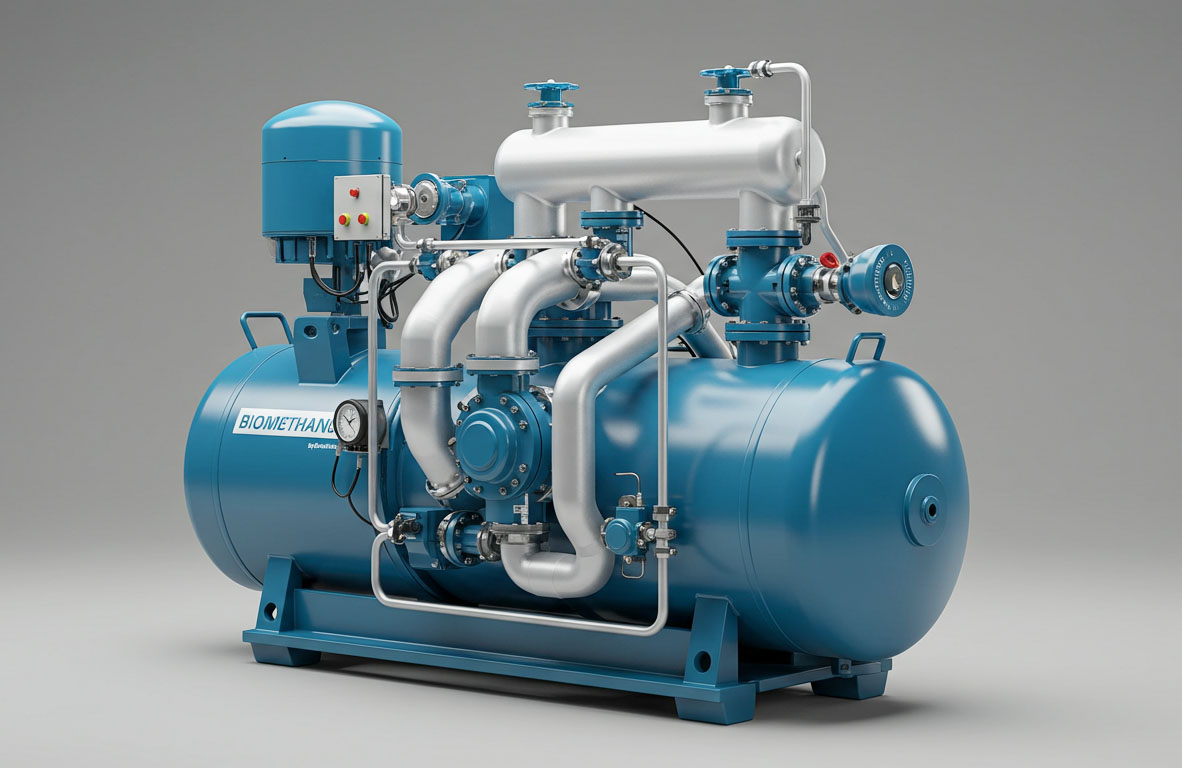Hydrogen Chloride Compressor: Essential Equipment for Chemical Processing Plants
Hydrogen chloride compressor (HCl) is an extremely reactive gas used widely throughout the chemical industry for manufacturing PVC, fertilizers and other chemicals. Due to its hazardous nature, special handling and transportation equipment must be employed when handling and transporting this substance; among them being an HCl compressor.

An HCl compressor is a machine used to compress hydrogen chloride gas at high pressure and transfer it through pipelines into other parts of the production process. Their design and operation is essential to the safety and efficiency of production; in this article we’ll address its fundamentals, design considerations for HCl compressors, operational safety concerns, maintenance/servicing considerations as well as environmental regulations as well as answer frequently asked questions (FAQs).
Key Takeaways
- Hydrogen chloride is a highly reactive gas that requires specialized equipment for handling and transportation.
- HCl compressors are critical to the safety and efficiency of the HCl production process.
- Proper design, operation, maintenance, and servicing of HCl compressors are essential to ensure safe and efficient production of HCl.
Fundamentals of Hydrogen Chloride Compression
Hydrogen chloride (HCl) is an extremely corrosive gas used in numerous industrial processes, such as PVC production, semiconductor fabrication and pharmaceutical development. For safe transport and storage of this corrosive substance, hydrogen chloride compressors must compress it into liquid form for transport or storage purposes – hence their value proposition for companies storing hydrogen chloride safely.
Hydrogen chloride compression involves raising the pressure of HCl gas until it can be condensed into liquid form, then stored and transported.
Compressing HCl gas requires several considerations when compressing. First, its material must withstand its corrosive nature; secondly, its design must allow it to handle high pressures needed; and thirdly it must operate efficiently at high temperatures – as HCl is often compressed at elevated temperatures to increase efficiency.
There are various types of compressors that can be used to compress HCl gas, including reciprocating compressors, centrifugal compressors and screw compressors. Each has their own advantages and disadvantages; choosing one will depend on your specific application.
Compressing hydrogen chloride gas (HCl) is an integral step to its safe transportation and storage. By understanding its fundamentals, engineers can design compressors tailored specifically for handling this highly corrosive substance.
Design Considerations for HCl Compressors
Hydrogen Chloride (HCl) compressors are essential equipment used in industrial processes that produce hydrochloric acid, PVC resin and other chlorine-based chemicals. Their design must take several factors into account such as material selection, corrosion resistance and thermal management to be successful.
Material Selection
Selecting appropriate materials for HCl compressors is critical to their longevity and durability, as they must withstand the highly corrosive nature of HCl gas that could otherwise wreak havoc with internal components of the compressor. Common materials used are stainless steel, nickel alloys and titanium which offer excellent corrosion resistance as well as durability making them suitable for use in harsh environments.
Corrosion Resistance
Corrosion resistance should always be an important consideration when designing HCl compressors, given their highly corrosive nature. Corrosion can result in costly repairs and downtime for repairs to internal components of the compressor; to minimize corrosion damage, they should be coated in protective layers or made of corrosion-resistant materials such as Teflon, ceramic or glass; furthermore they must also be designed so as not to accumulate corrosive byproducts which accelerate corrosion.
Thermal Management
Thermal management is another essential consideration when designing HCl compressors. Compressing HCl gas generates heat, which can cause its internal components to overheat and fail prematurely. To avoid this from occurring, an effective cooling system must be designed into the compressor that dissipates this heat efficiently through means such as cooling jackets, water-cooled intercoolers or air-cooled heat exchangers; all with the aim of maintaining safe operating temperatures for its internal components to avoid premature failure of early failure of premature failure of its internal components premature failure premature failure premature failure of premature failure of internal components premature failure by overheating overheat and overheat is vital when designing HCl compressors.
As previously discussed, designing an HCl compressor requires careful consideration of several factors, including material selection, corrosion resistance and thermal management. By choosing suitable materials and developing an effective cooling system for the compressor, durability and longevity can be ensured thereby decreasing downtime and maintenance costs.
Operational Safety
Safety should always be paramount when operating a hydrogen chloride compressor, and many measures must be taken to ensure its safe operation. In this section, we will explore some key safety considerations when operating such an equipment.
Leak Detection
One of the key aspects of operating a hydrogen chloride compressor safely is leak detection. Hydrogen chloride is an extremely toxic gas that poses considerable danger if handled improperly; to keep operators safe it’s essential that a reliable leak detection system be in place, capable of detecting even small leaks quickly and notifying operators promptly of potential danger.
Pressure Control
Pressure control is another crucial element to keep in mind when operating a hydrogen chloride compressor, and must meet any specific pressure needs of your process. You should monitor pressure constantly to make sure it doesn’t exceed safe operating limits as any such deviation could lead to catastrophic failure of the compressor itself.
Emergency Shutdown Procedures
Emergency shutdown procedures must also be established in case of an unexpected event. All operators should understand these procedures so they can quickly and safely shut off the compressor in an emergency, helping prevent further damage or injury to themselves or others.
Operating a hydrogen chloride compressor safely demands careful consideration and dedication to safety. By taking steps discussed here, operators can minimize the risk of accidents while simultaneously ensuring efficient performance from their compressor.
Maintenance and Servicing

Routine Checks
To ensure the safe and efficient operation of a hydrogen chloride compressor, it is essential to conduct regular routine checks. These checks should be carried out by trained personnel and should include inspections of all components, including the compressor, motor, and control system.
One of the most critical routine checks is monitoring the compressor’s lubrication system. The lubrication system should be checked regularly to ensure that all components are functioning correctly and that there is sufficient oil in the system. If the oil level is low, it must be topped up immediately to prevent damage to the compressor.
Other routine checks include inspecting the compressor’s valves, filters, and pressure gauges. These components should be checked for signs of wear and tear and replaced if necessary. Regular inspections of the cooling system are also essential to ensure that the compressor is not overheating.
Wear and Tear Management
Despite regular routine checks, wear and tear are inevitable in any mechanical system. To manage wear and tear effectively, it is essential to have a comprehensive maintenance and servicing plan in place.
The maintenance plan should include regular inspections and component replacements, as well as a schedule for more extensive maintenance tasks, such as cleaning and overhauling the compressor. It is also essential to keep detailed records of all maintenance and servicing activities to track the compressor’s performance over time.
When wear and tear is detected, it is essential to take action immediately to prevent further damage to the compressor. Depending on the severity of the wear and tear, the compressor may need to be repaired or replaced entirely. In some cases, upgrading the compressor’s components may be necessary to improve its performance and extend its lifespan.
By following a comprehensive maintenance and servicing plan, it is possible to ensure the safe and efficient operation of a hydrogen chloride compressor for many years to come.
Environmental Impact and Regulations

Emission Standards
Hydrogen chloride is a highly corrosive and toxic gas that can have severe environmental impacts if released into the atmosphere. As a result, various regulatory agencies have established emission standards to limit the release of hydrogen chloride into the environment.
In the United States, the Environmental Protection Agency (EPA) has established National Emission Standards for Hazardous Air Pollutants (NESHAP) that apply to hydrogen chloride emissions from various industrial processes. These standards require the use of emission control technologies, such as scrubbers, to reduce hydrogen chloride emissions to acceptable levels.
Similarly, the European Union has established emission standards for hydrogen chloride under the Industrial Emissions Directive (IED). The IED requires that industrial facilities meet Best Available Techniques (BAT) standards, which include the use of emission control technologies, to limit hydrogen chloride emissions.
Waste Handling
In addition to emission standards, regulatory agencies also require the proper handling and disposal of hydrogen chloride waste. Hydrogen chloride waste can be generated during the production and use of hydrogen chloride, as well as during the maintenance and decommissioning of hydrogen chloride equipment.
Proper waste handling and disposal can help prevent environmental contamination and protect human health. Waste handling practices typically include the use of protective equipment, such as gloves and respirators, to prevent exposure to hydrogen chloride, as well as the use of specialized containers and storage facilities to prevent leaks and spills.
Overall, the proper handling and disposal of hydrogen chloride waste is critical to minimizing the environmental impact of hydrogen chloride compressors. Regulatory compliance with emission standards and waste handling requirements can help ensure that hydrogen chloride compressors are used safely and responsibly.
Frequently Asked Questions

What are the different types of compressors suitable for hydrogen chloride gas?
There are several types of compressors that are suitable for hydrogen chloride gas, including reciprocating, screw, and centrifugal compressors. The choice of compressor depends on the specific application and the required flow rate and pressure.
How does a hydrogen recycle compressor work in industrial applications?
A hydrogen recycle compressor is used to compress hydrogen gas that has been recovered from a process and recycle it back into the process. These compressors are typically centrifugal or reciprocating compressors and are designed to handle the specific properties of hydrogen gas.
What are the advantages of using a screw compressor for hydrogen chloride?
Screw compressors are known for their high efficiency and reliability, making them a popular choice for hydrogen chloride compression. They are also able to handle a wide range of flow rates and pressures, making them a versatile choice for many industrial applications.
Can hydrogen chloride be compressed into a liquid form, and if so, how?
Hydrogen chloride can be compressed into a liquid form under high pressure and low temperature. The process involves cooling the gas to below its boiling point and then compressing it to a high pressure. The resulting liquid can be stored and transported more easily than the gas form.
What are the cost considerations when purchasing a hydrogen gas compressor?
The cost of a hydrogen gas compressor depends on several factors, including the type of compressor, the required flow rate and pressure, and the specific application. Other factors to consider include maintenance and operating costs, as well as any safety requirements.
What safety measures are important when dealing with hydrogen chloride compression?
Hydrogen chloride is a hazardous gas that can pose serious health and safety risks if not handled properly. It is important to follow all safety guidelines and regulations when working with hydrogen chloride, including proper ventilation, personal protective equipment, and emergency procedures.


